Christian Unschooling: Language Arts
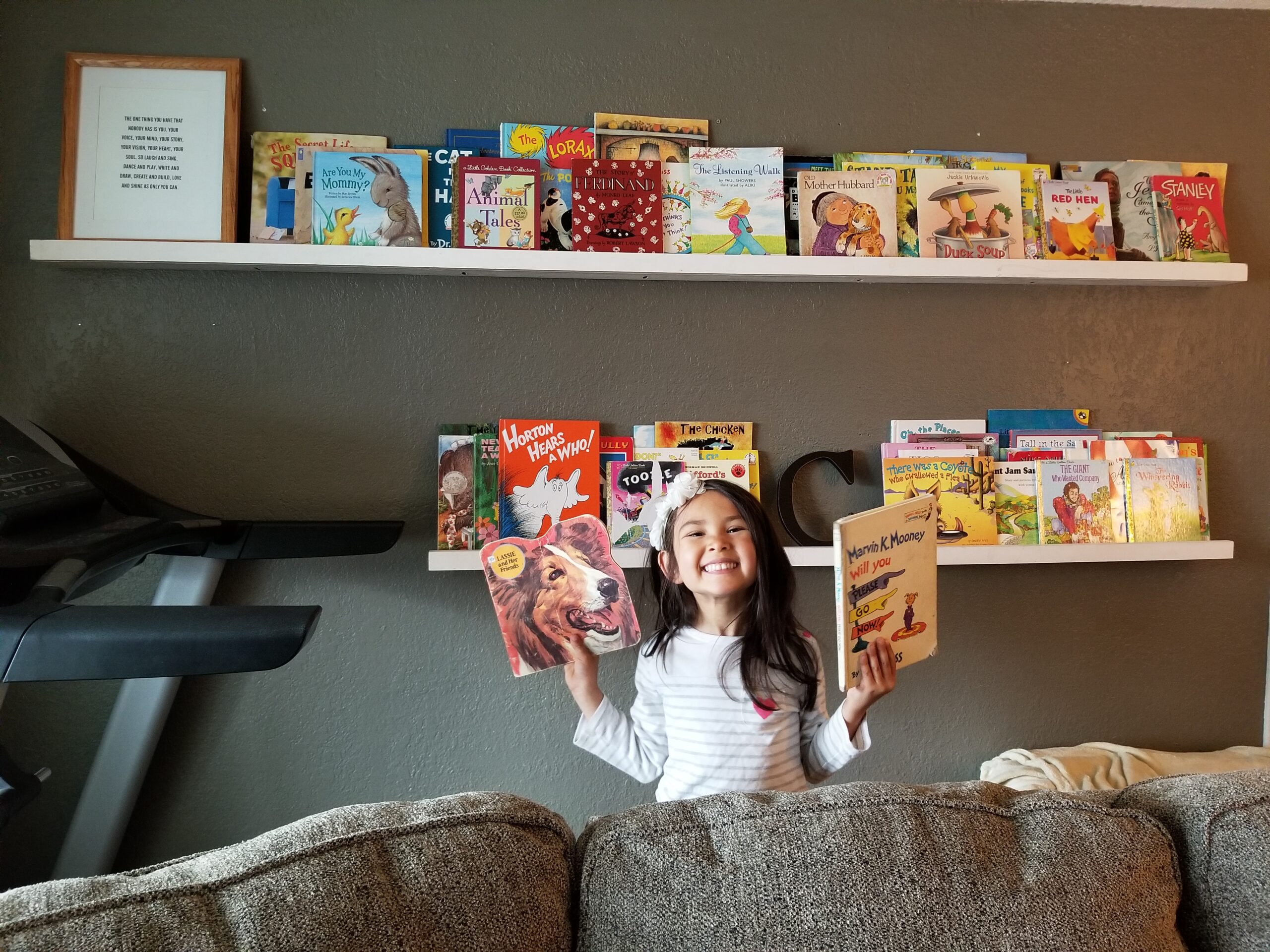
Unschooling language arts is really about: WORDS.
Jesus is … The Word.
The world was created with … words.
All of humanity (regardless of nation or race) communicates through … words.
Words are the way we process, understand, and even create and shape the world around us. They form our thoughts, which form our paradigms, which form our behaviors.
Words, I believe, are the bedrock of society.
Words are a Way of Life
With this mindset, unschooling language arts isn’t so much a subject to be learned in our home as it is the way we live and interact with each other.
From Birth
Reading aloud (and singing … um, I’m not a singer either) to my kids was the first way I “homeschooled” them; surrounding and saturating them with words and stories even before they could speak themselves.
Reading aloud not only exposes young kids to a breadth of vocabulary and ideas, but to rhythm, cadence, and intonation in storytelling and speech, which will help make learning the art and mechanics of writing easier in the later years.
For more on the importance of reading aloud, including practical strategies and age-appropriate book lists, I HIGHLY recommend The Read Aloud Family: Making Meaningful and Lasting Connections with Your Kids by Sarah Mackenzie.
Unschooling Language Arts in Early Childhood
The minds of young children are utterly fascinating; kids will freely reveal the depths of their imaginations as well as how they are perceiving the environments in which they are growing up in, if given the time to express themselves.
At this stage, kids don’t need to be bombarded with language rules. Besides good books, just give them a captive audience and you’ve basically given them the very beginnings of their lessons in writing, speech, and rhetoric!
As my own kids moved on from babble and developed their communication skills, I grew muscles in patience listening to their long, drawn-out stories, LOL. But I firmly believe this is why my kids are relatively strong communicators today (not only in their writing and speaking, but in listening as well).
Unschooling Language Arts with Older Children
As they continued to grow, we encouraged discussion of all kinds. Not just about books we read or things we were learning about, but also about deep things on their hearts and minds, current events, the real-time plight of people we care about in order to speak how the gospel applies and so we can pray accordingly, etc. Dialogue has always been, and still is, a way of life for our crew.
You can also challenge kids to practice the art of persuasion when they are wanting you to purchase something for them. For example, at one point, Big Sis wanted to get a pet bunny. We told her that she needed to persuade us why she should get a pet bunny before we could give her an answer. She was so motivated that she spent a whole day preparing a full-blown presentation for us (though, to her disappointment, she didn’t get a pet bunny because we already had a dog that would legit eat any other living creature in our home … but we did reward her for her effort in a different way, LOL).
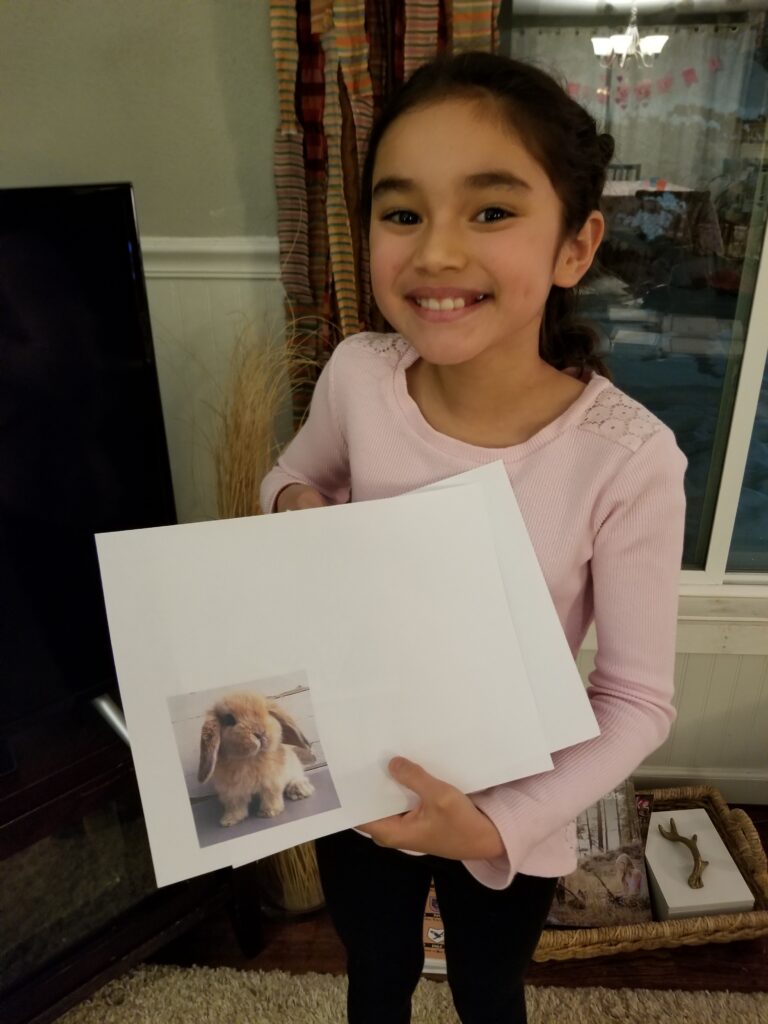
Tools to Help with Unschooling Language Arts
With all that said, I did use a myriad of other resources over the years to help refine my kids’ communication skills. Below I share our favorites:
This post contains affiliate links and we may earn compensation when you click on the links, at no additional cost to you.
Pre-Readers/Beginning Readers
Manipulatives
All three of my kids started out at an amazing, Jesus-loving, mission-minded preschool (more for my benefit, really), which is where they primarily learned the basics of their ABCs and 123s.
But I supplemented at home with fun Magnetic Letters and yummy Alphabet Cookies to help reinforce letter identification and their sounds.
These manipulatives were also a great way to practice spelling CVC (consonant-vowel-consonant) and other simple words. Learning through play is the best way!
The Doodler
Make learning to write fun! The Doodler is a lightweight, portable, mess-free LCD writing tablet perfect for little hands! Kids not only can learn their letters and numbers but also develop their fine motor skills by tracing the included cards. These are also great for screen-free entertainment at home and on the road because they can also be used as a creative doodle board.
Pre-Literacy Flash Cards
Colorful flash cards like these served as creative prompts for making up stories even before they could even write! We would make it a game where everyone was dealt a handful of cards and we would add to the story as we went along. It got silly, and even crazy, often!
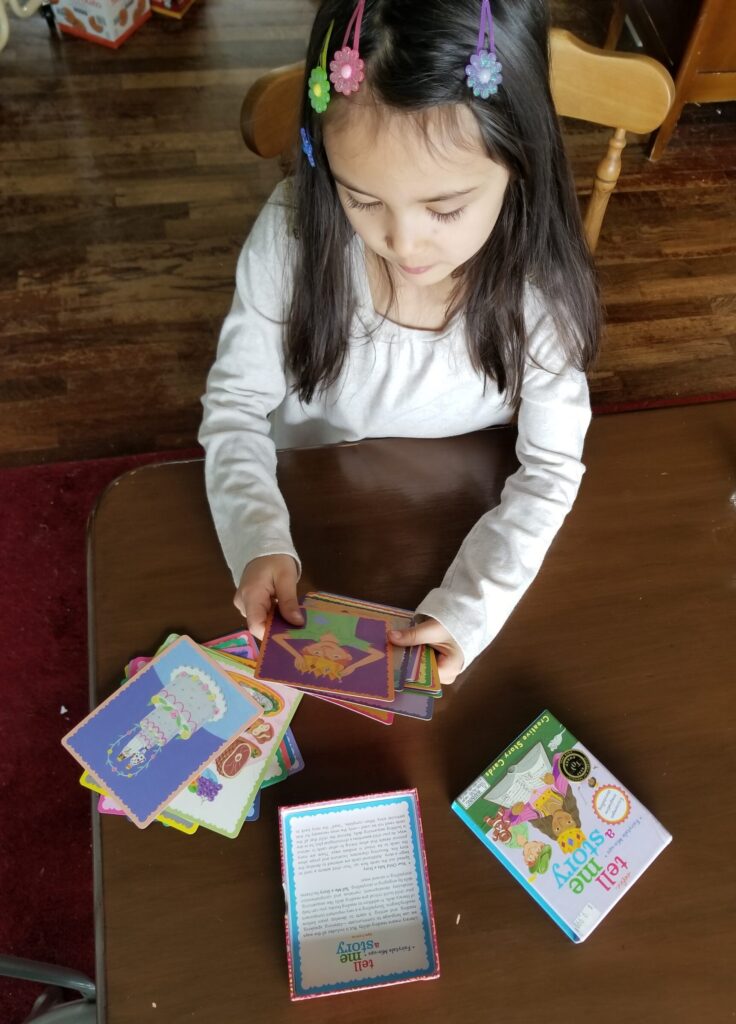
BOB Books
My kids also really enjoyed BOB Books as they initially learned how to read on their own. The clean layout and illustrations, coupled with short words and sentences helped them gain confidence each time they completed a book, which only inspired them to keep progressing through each level.
Elementary Stage
My older two kiddos (Big Bro and Big Sis) started off with boxed curriculum, where language arts was integrated into the lessons. I have no real complaints about the programs we used, but because of my own forming convictions about how children learn best (at least my own children), I realized that this “check the box” route wasn’t really serving them well. We eventually ditched the boxed curriculum and began our journey to unschooling, which is all that my youngest (Baby Sis) knows!
So, besides reading aloud and having lots of discussions, the following is a big part of how language was developed in our unschooling home:
Weekly Library Trips
Weekly trips to the library were a staple in those early years. When children are able to select the books they are interested in, they have more desire to read them! Whether the selections seem too “young” or too “advanced” for them doesn’t matter, as long as they are interested in the books they are consuming.
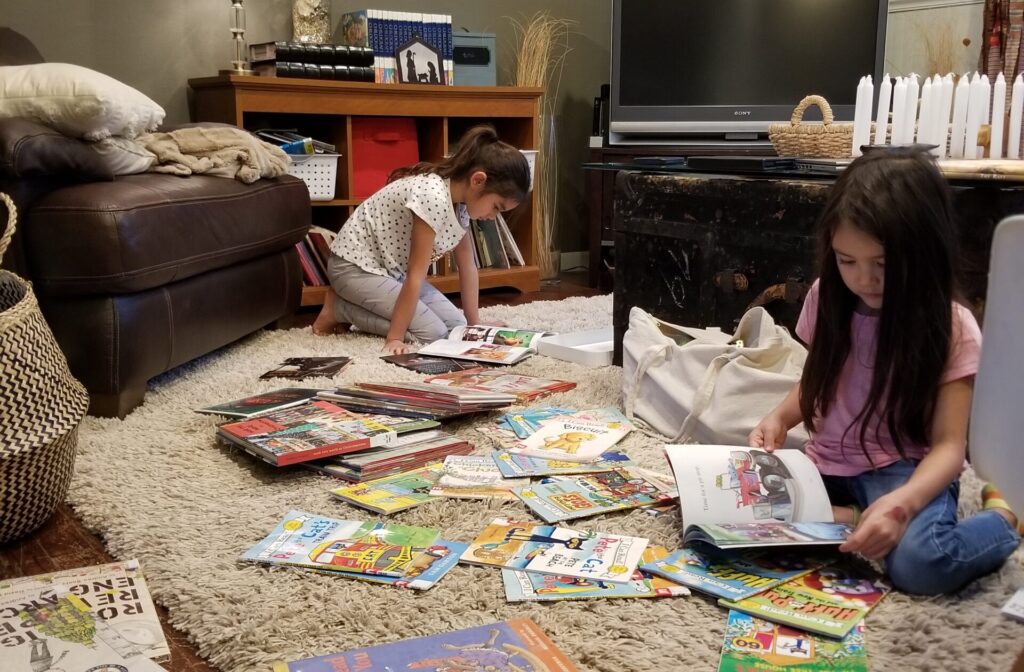
Brave Writer Lifestyle
When I first began to move away from boxed curriculum, we became Brave Writers and LOVED it! This program holds your hand, as you gently lead your own kids to love the process of putting words down on paper. The biggest idea behind the Brave Writer program is that “writing becomes a safe playground instead of an intimidating foreign country”; where original ideas are expressed freely and not stifled by the process and mechanics of writing. It was a huge help for me as I moved away from a more structured approach, and I learned so many ideas for how to make writing enjoyable for my kids over the long haul.
While they have many resources, we personally used both their Writing Projects guides (which gives you all kinds of ideas for cultivating a love for writing) and their Literature Singles (guides to go along with books we were already reading), and even then – we used as needed to fit my people’s needs.
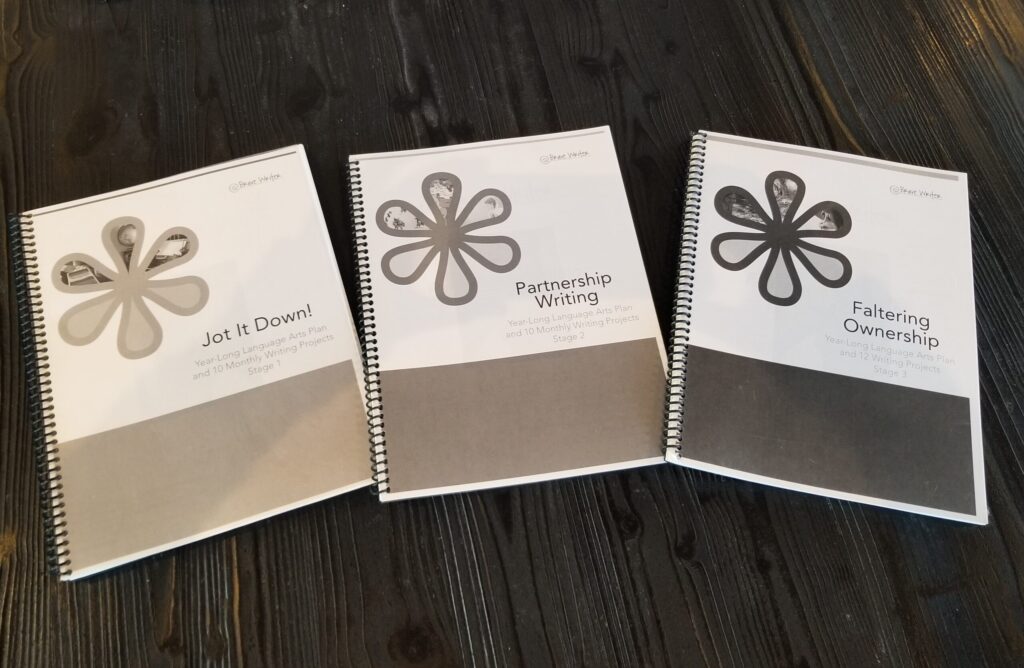
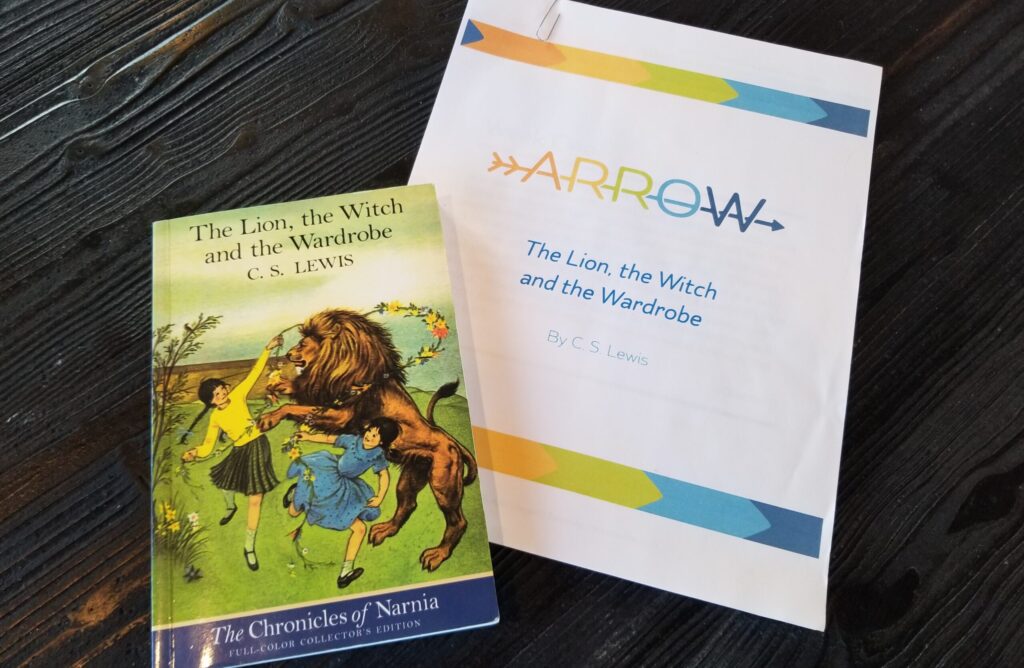
Below is an example of one of the writing projects my big kids did after reading The Lion, the Witch, and the Wardrobe. They recreated the scene where Lucy enters Narnia for the first time, as she looks back over her shoulder to the open wardrobe, before continuing. So much more fun than a regular book report!
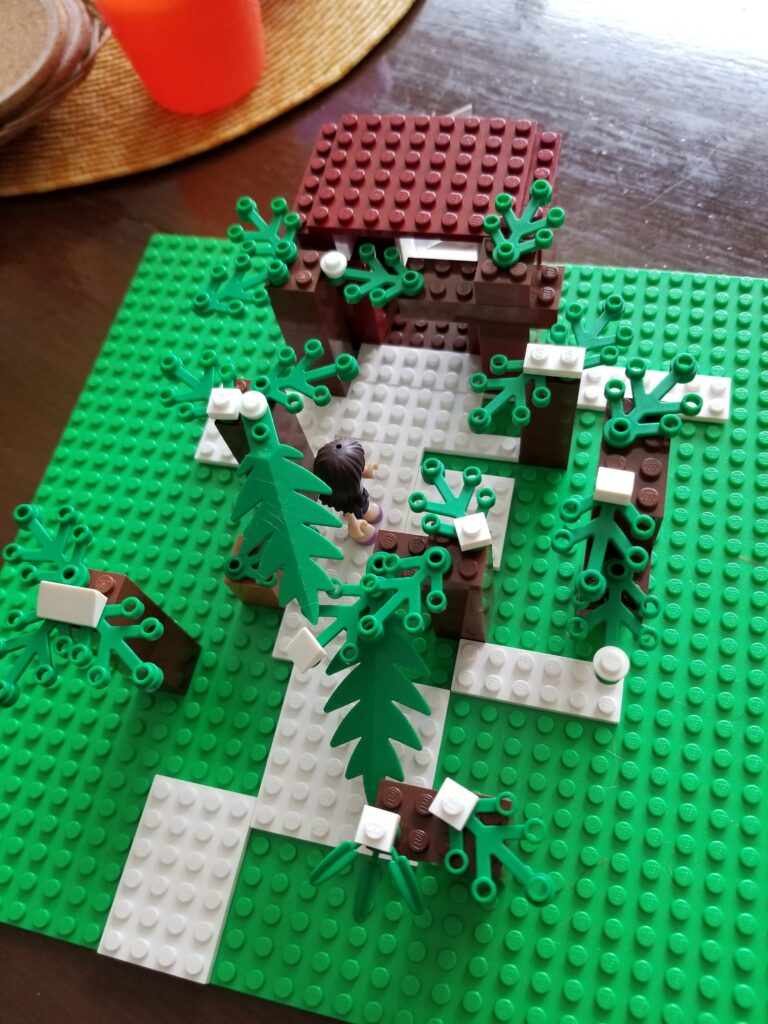
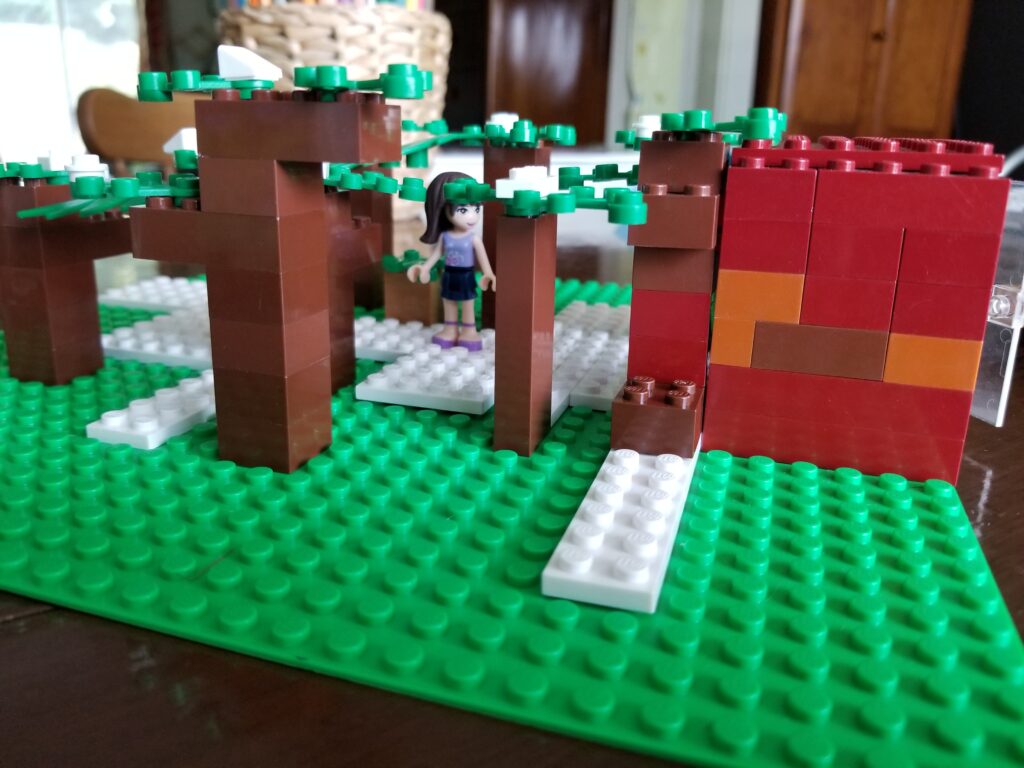
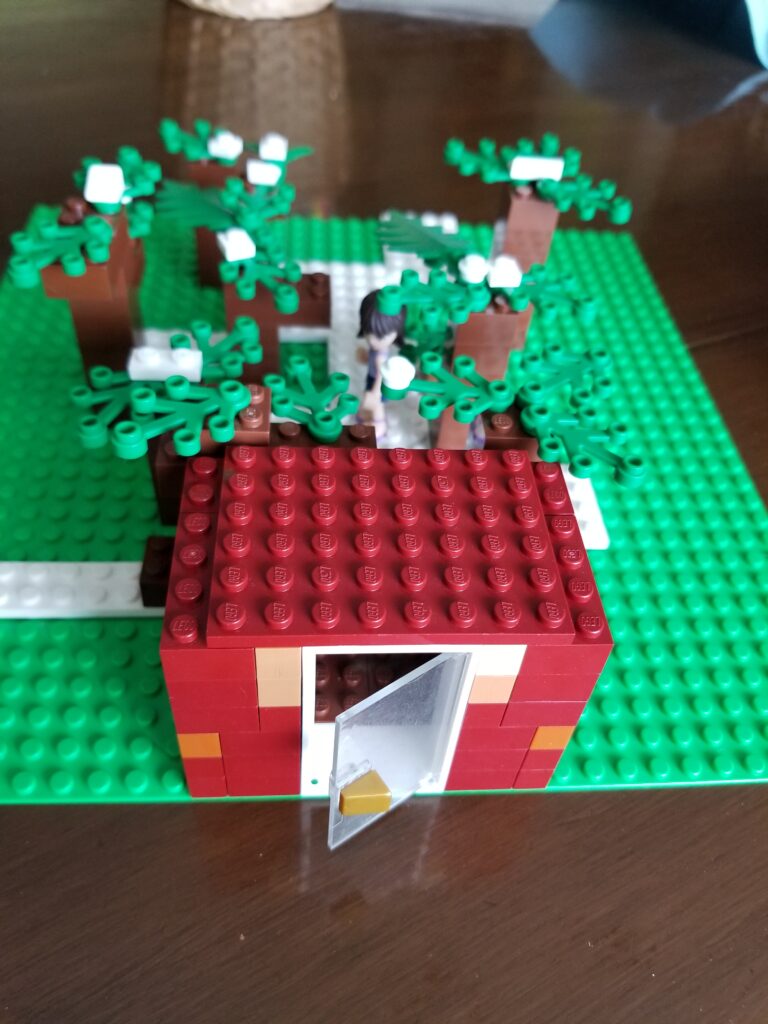
Copy Work
Copy work serves as a gentle and natural way to learn grammar, vocabulary, spelling, punctuation, etc.
Instead of disjointedly deconstructing language the way most students learn in classrooms, we get to “see” the wholeness and beauty of language by re-writing sections of text from what we are already reading; what we already have a relationship/connection with.
Below are snaps of the time the kids expressed missing doing “sit-down work” after having moved towards the unschooling life. On a spontaneous whim, they pulled out their journals (and some ice cream!) and did some copy work from the book we were reading at the time, Harry Potter and the Sorcerer’s Stone.
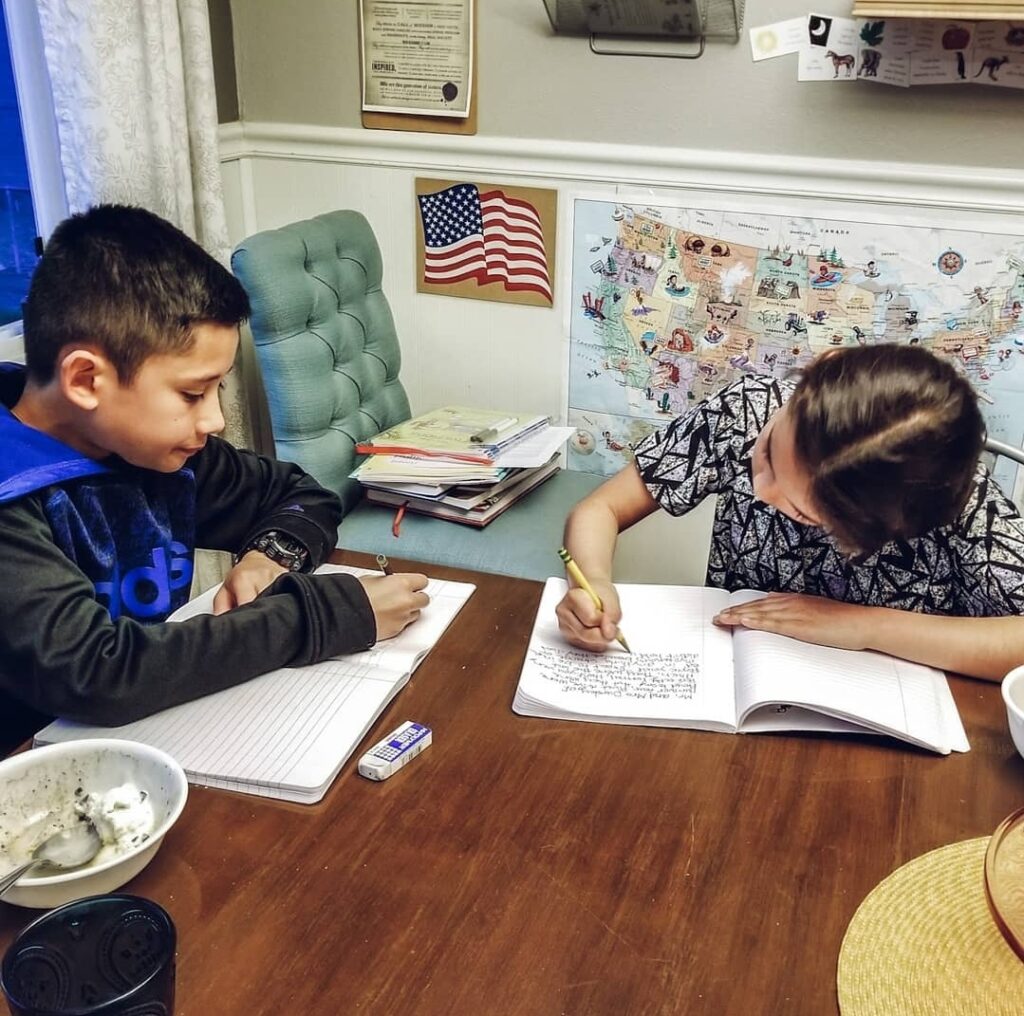
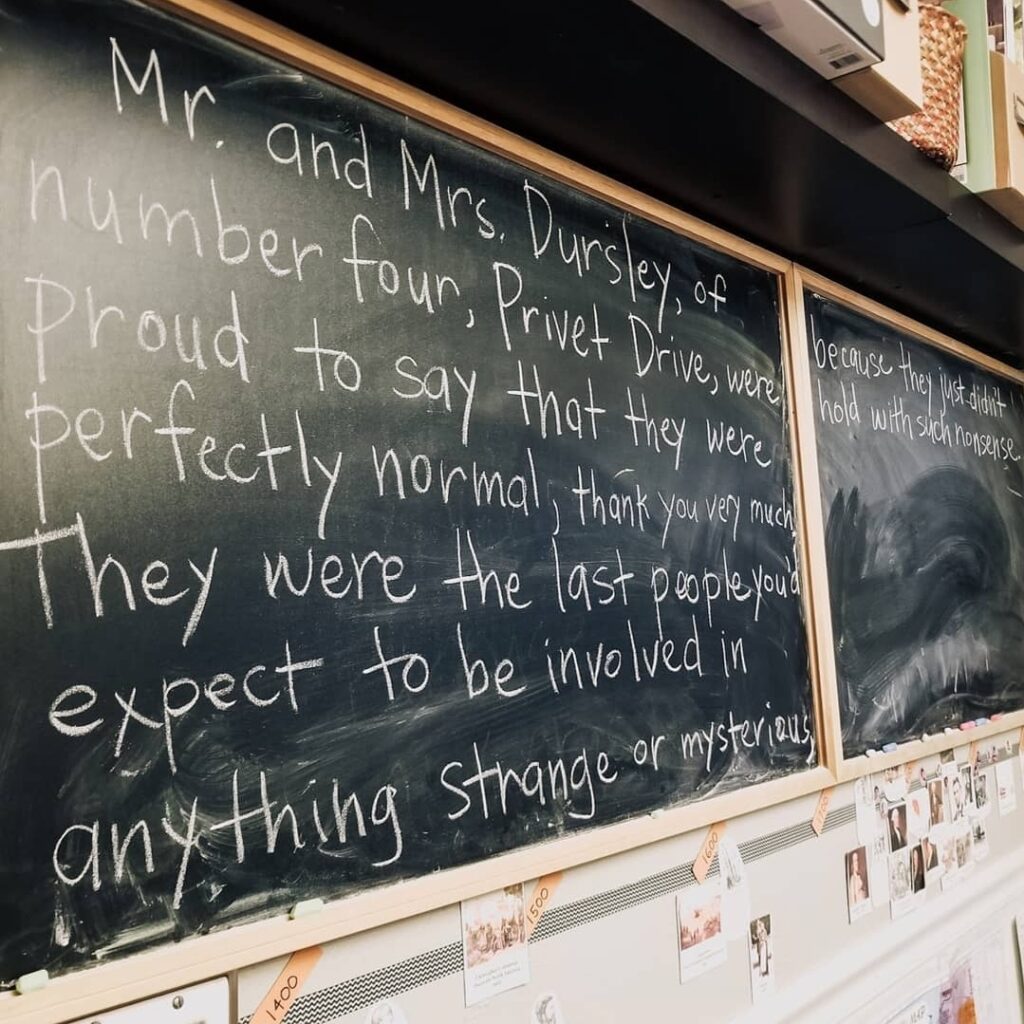
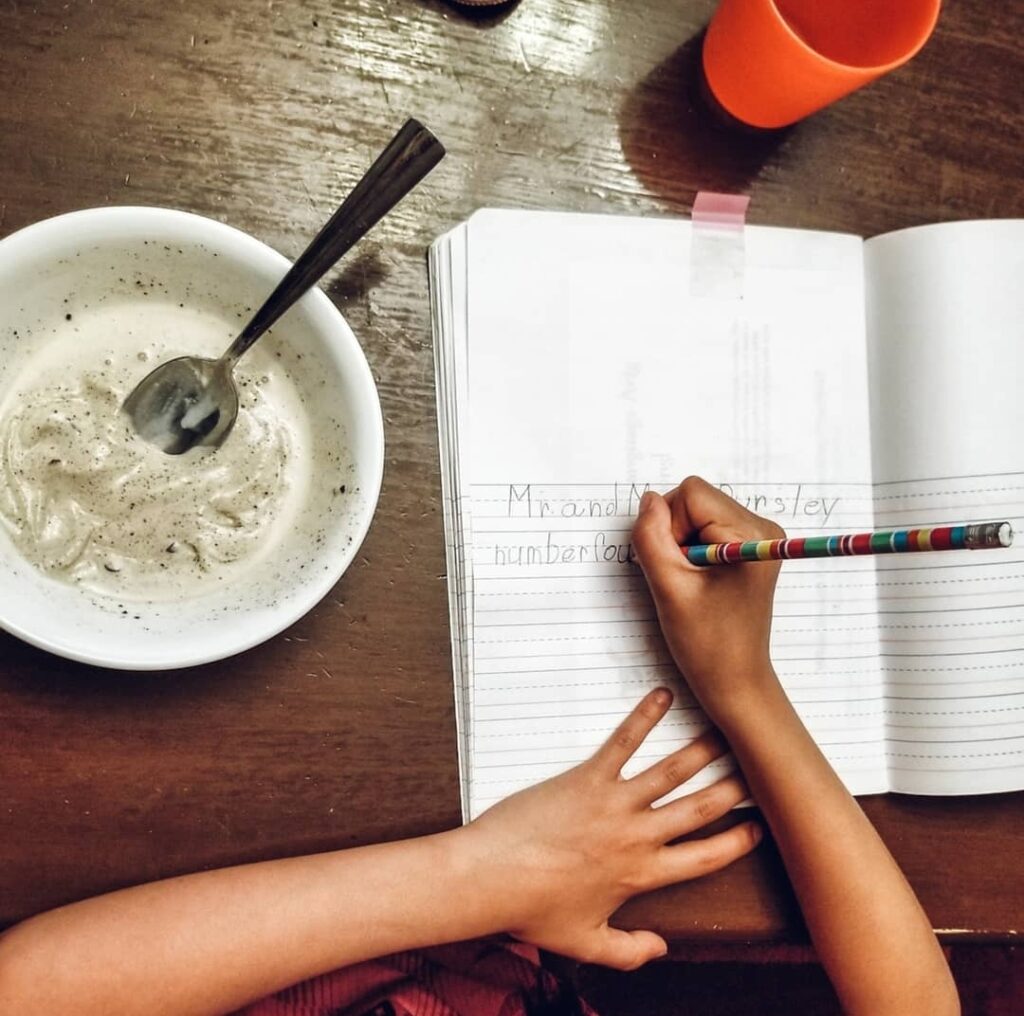
Usborne Creative Writing Books
We love the creative writing books in this Writing Box Set. They each have colorful and fun illustrations, as well as prompts for writing stories, poems and essays. These are great to have around; my girls simply use them as they feel compelled to.
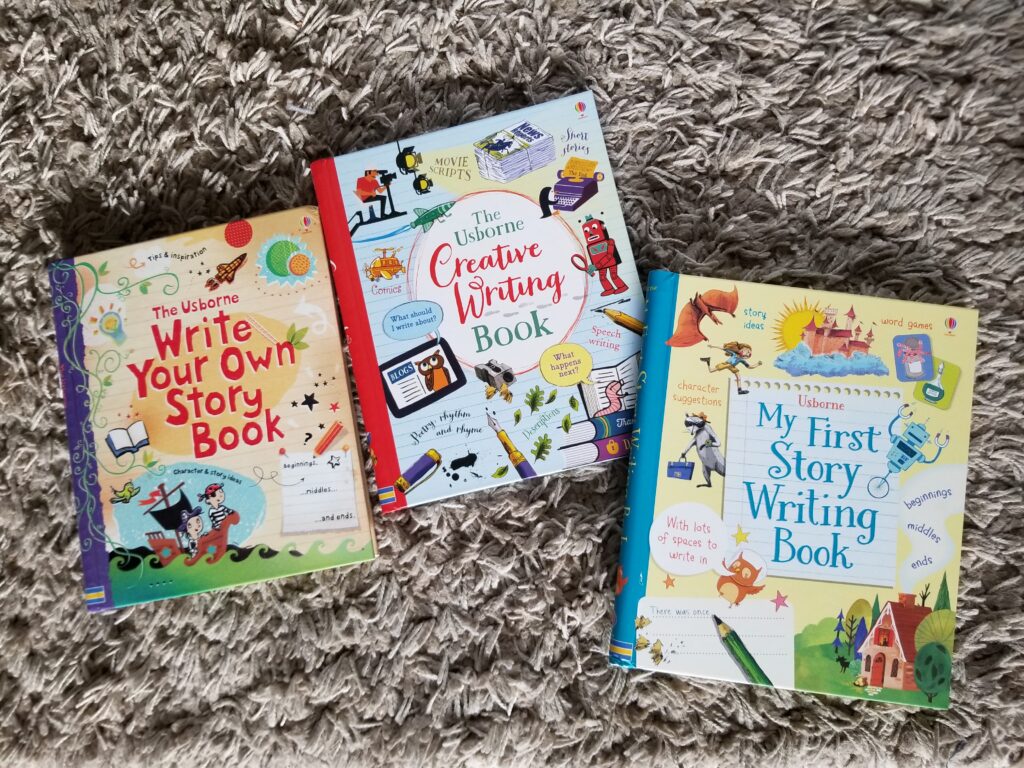
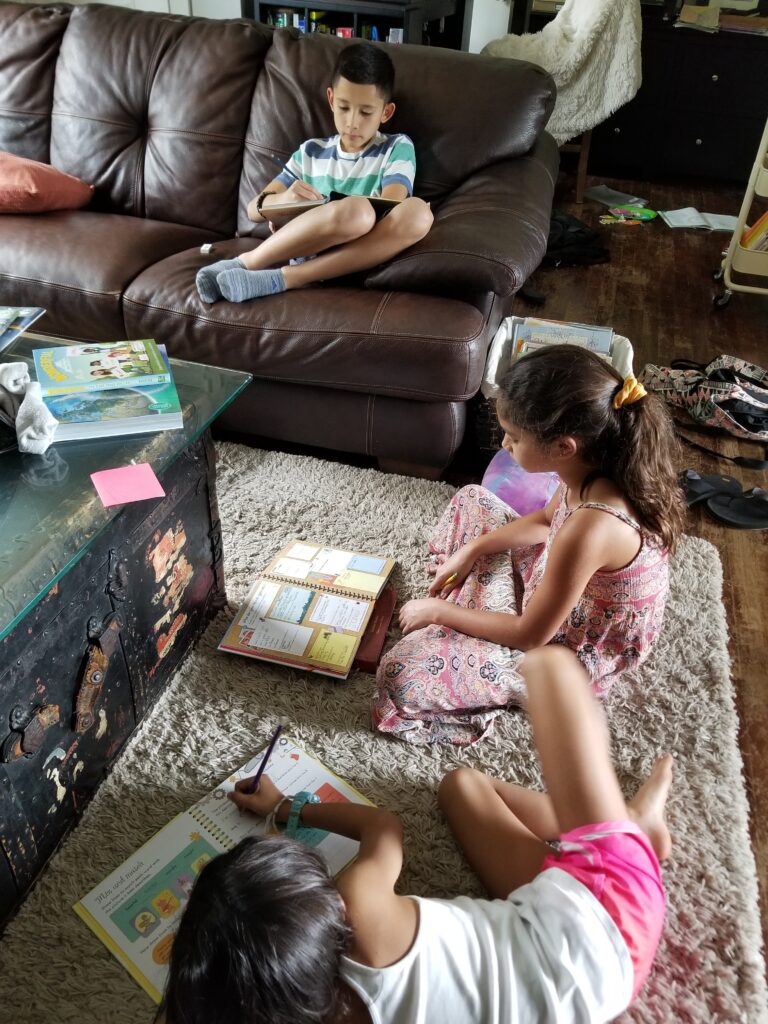
Bananagrams
Bananagrams is a fun and interactive way to reinforce vocabulary and spelling (we don’t use separate curriculum for those subjects)!
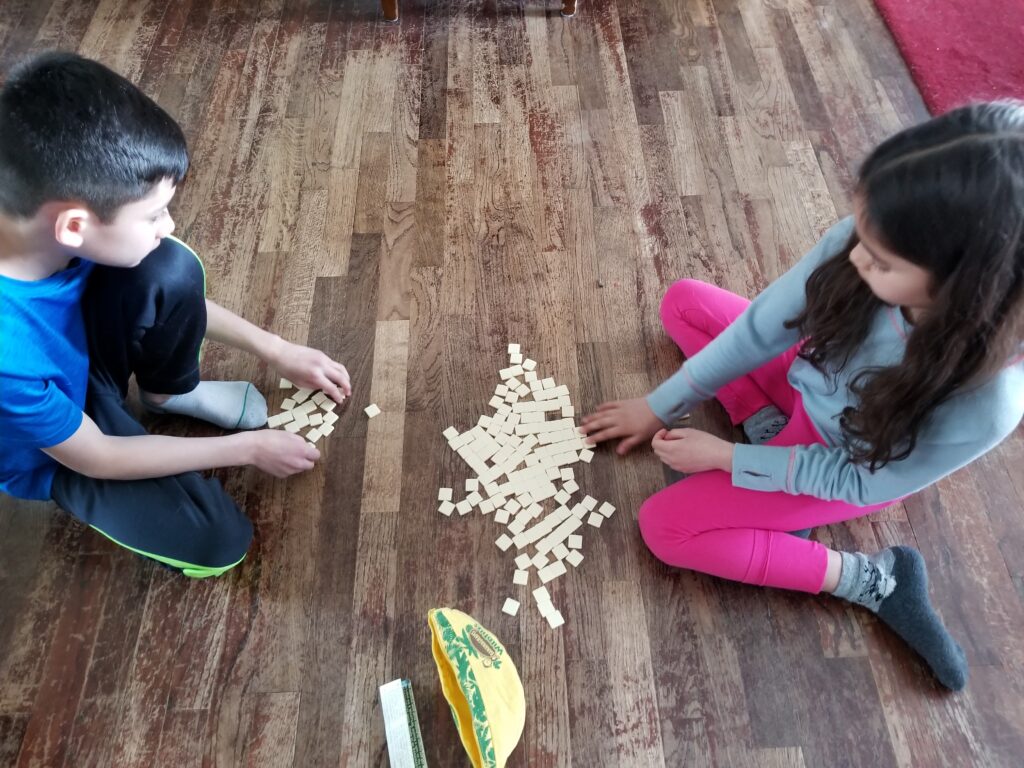
Language Arts Posters AKA Giant Flashcards
LOL, so these are actually posters meant to hang up on walls but since we don’t have a ton of wall space, my girls have been having a blast using them as “giant flash cards” as a silly and fun way to review grammar and parts of speech!
Tea Time
We cherished our weekly tea times at this stage! There’s just something about sitting down together with a warm drink and a treat, whether it was to read poetry, fiction, or simply spend time together and talk about whatever was on our hearts and minds. Read, discuss, listen, repeat.
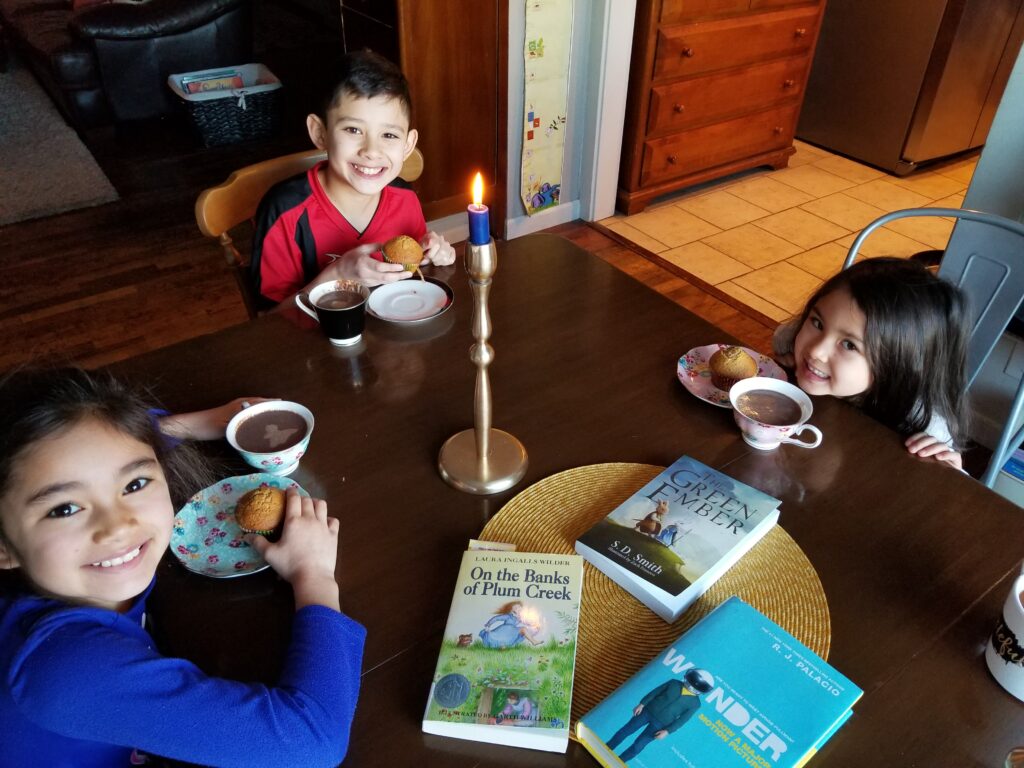
Middle School/Junior High Stage
Both my girls are currently in this stage and are now fully self-directed in the area of “language arts”. They read independently and work on their own writing projects (short stories, chapter books, scripts, writing letters, creating game instructions, etc.) as they feel led (which is actually often; the fruit of a words-loving home!). I don’t make them do worksheets or write papers, but they will do those things when they feel like it!
When they are writing for others, and want to make their work polished, I will work with them to cover things like grammar, punctuation, structure, etc. But this approach happens when their desire initiates the process, instead of me forcing them to learn those things week, after week, after week, just because traditional education does so.
UPDATE (SEPTEMBER 2024): We discovered these Funschooling Books earlier this year and they’ve been a hit, especially for Baby Sis (who is almost 13 years old as of this update). She uses them as part of her self-directed learning activities, which I already outline above.
High School Stage
Big Bro is in this stage of learning (currently a 10th grader) and has chosen to continue with Brave Writer’s resources; he is currently going through their self-directed writing program called Help for High School. In his own words:
“It feels like Julie (the author) is talking directly to me, walking me through every step of the writing process. I am accomplishing a lot because of how action-oriented the program is, but without the typical, dry classroom instruction feel. Writing isn’t mundane or boring with this program.”
And because he now values the importance of a strong vocabulary as he grows into an adult, this year we are going through English from the Roots Up, which we actually had saved from one of the boxed curriculum programs we used back in the day.
It teaches the way that English words were created from root words originating in other languages, like Greek and Latin. We don’t even use it exactly the way it is prescribed, but are simply working through the list of roots and familiarizing ourselves with them. And actually, Big Sis and Baby Sis are learning alongside him because they are wanting to grow their vocabulary as well!
I also want to note – for those curious about what unschooling can look like – that his current convictions and motivations are why he is using these specific resources this year. Last year, as a 9th grader, he used ZERO language arts resources, did almost ZERO “formal” writing (besides his own journaling) and simply read books he was interested in.
The Bottomline of Unschooling Language Arts
- Read good books to them often, so that they select good books for themselves, and grow a lifelong love for reading.
- Encourage all kinds of discussions, listen to them, cultivate relationship with them, and see them eventually grow to be strong communicators who know how to form and convey ideas. Words matter so make it a priority in your home.
- Harness the power and variety of resources and tools available (there are so many too choose from!) to make learning the art and mechanics of writing something your kids won’t look at with disdain.
I hope this post helps!

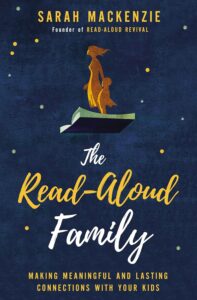
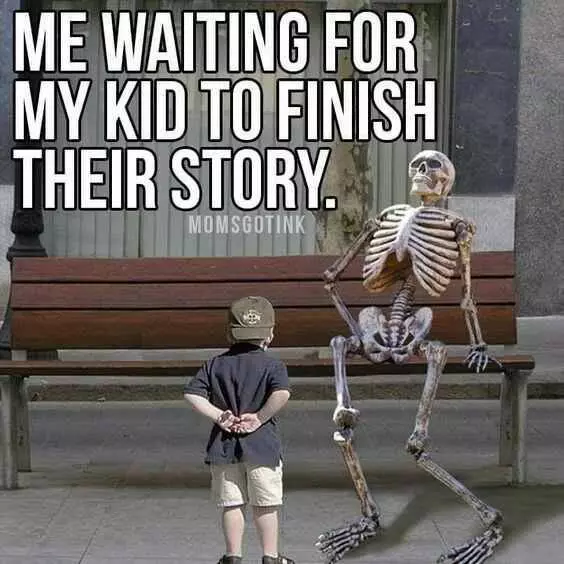
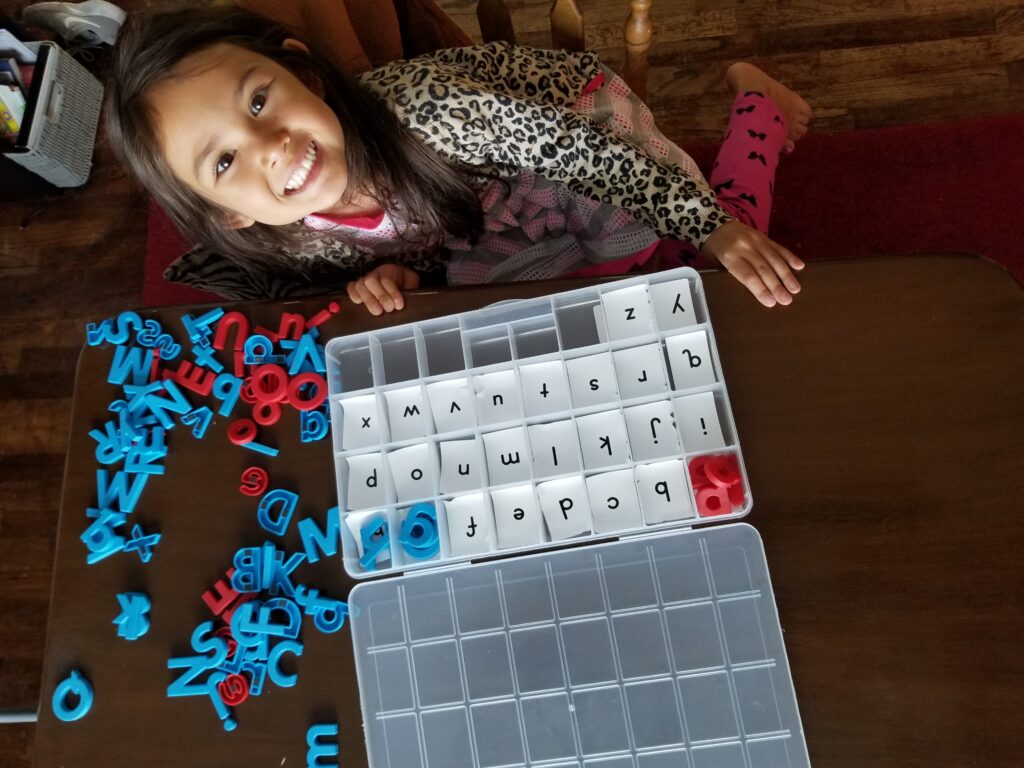
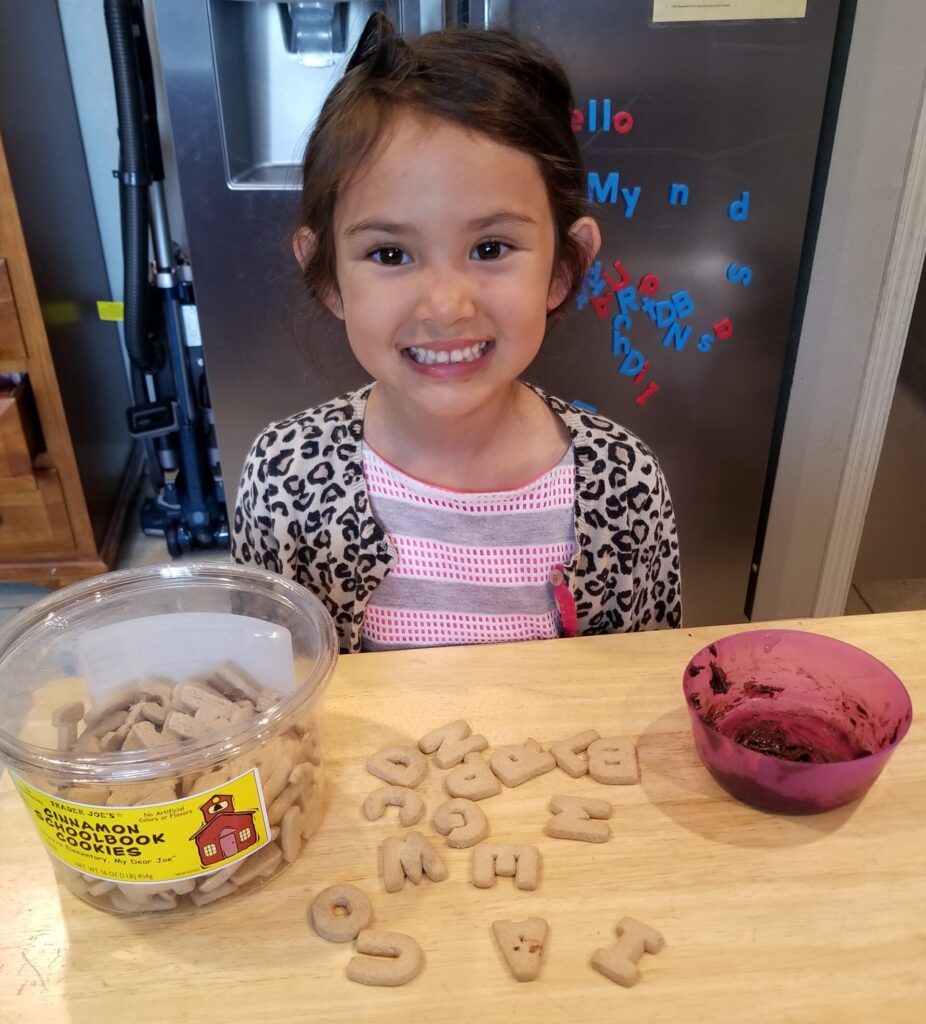
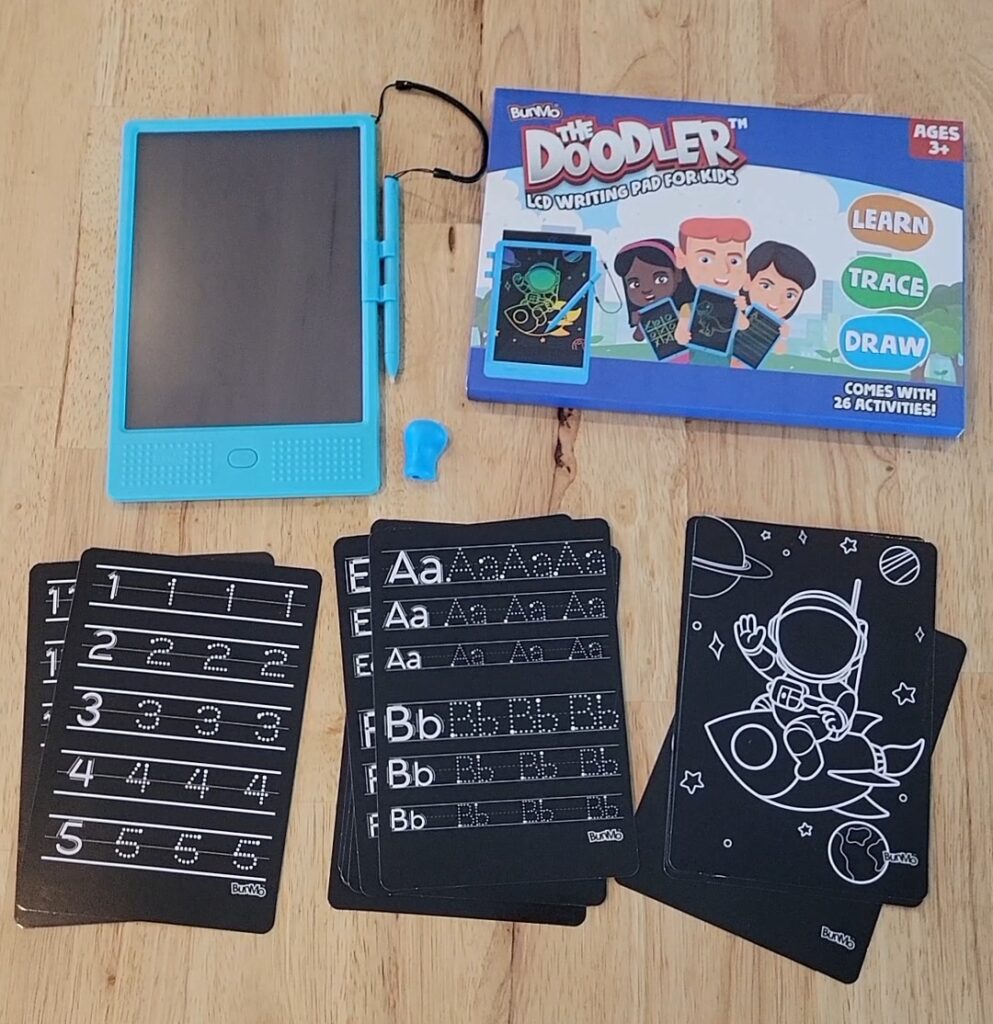
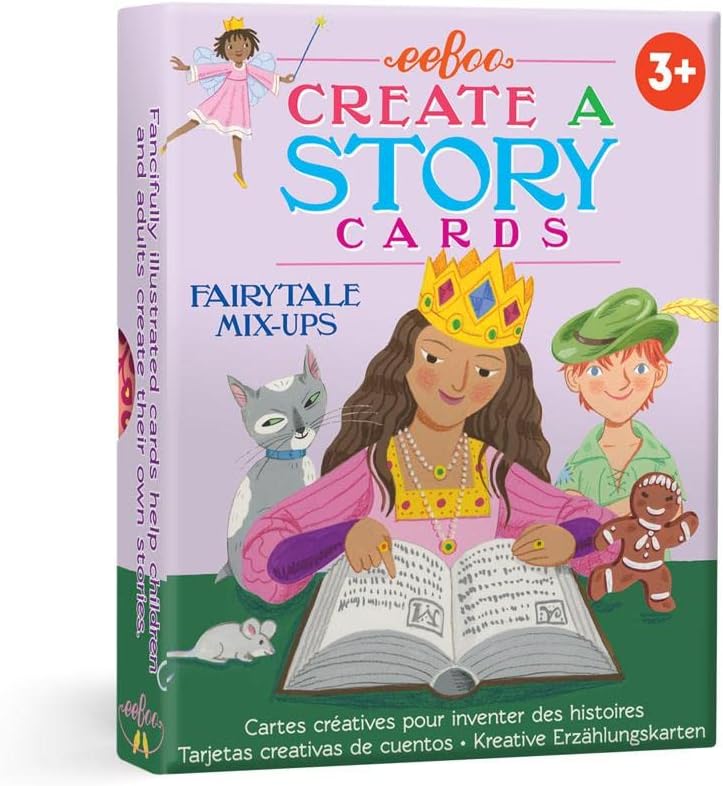



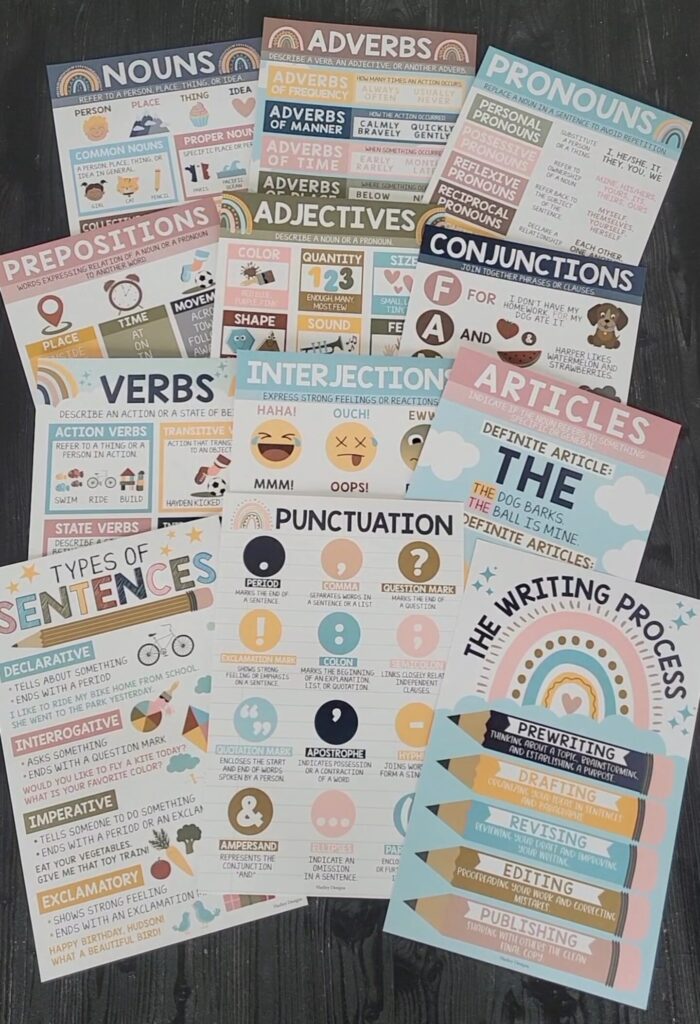
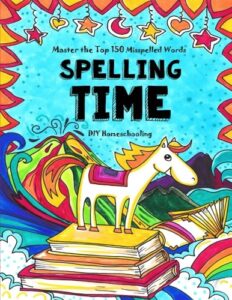
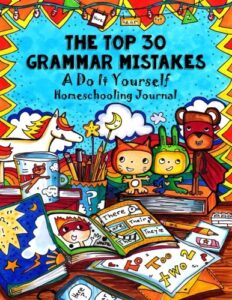
What you describe is similar to how we do language arts in our homeschool. Even though I am a veteran homeschooler of 20 years with three grown children (and two still at home), I still sometimes doubt myself. Thanks for the encouraging post!
Thank you so much for reading, Gina!